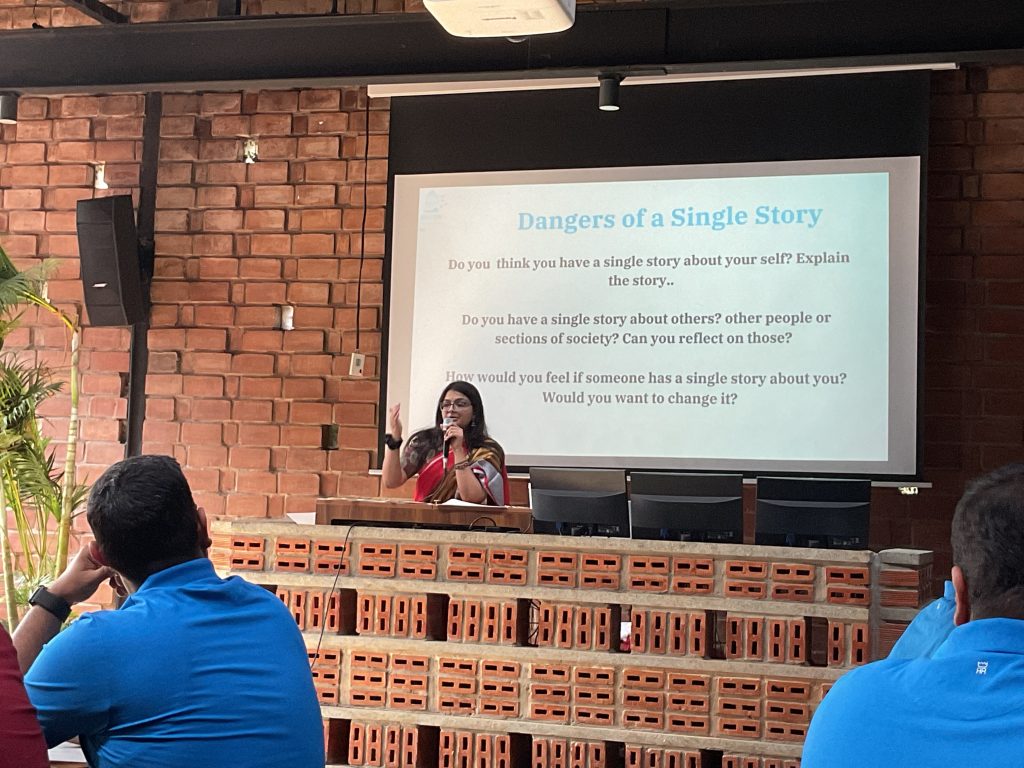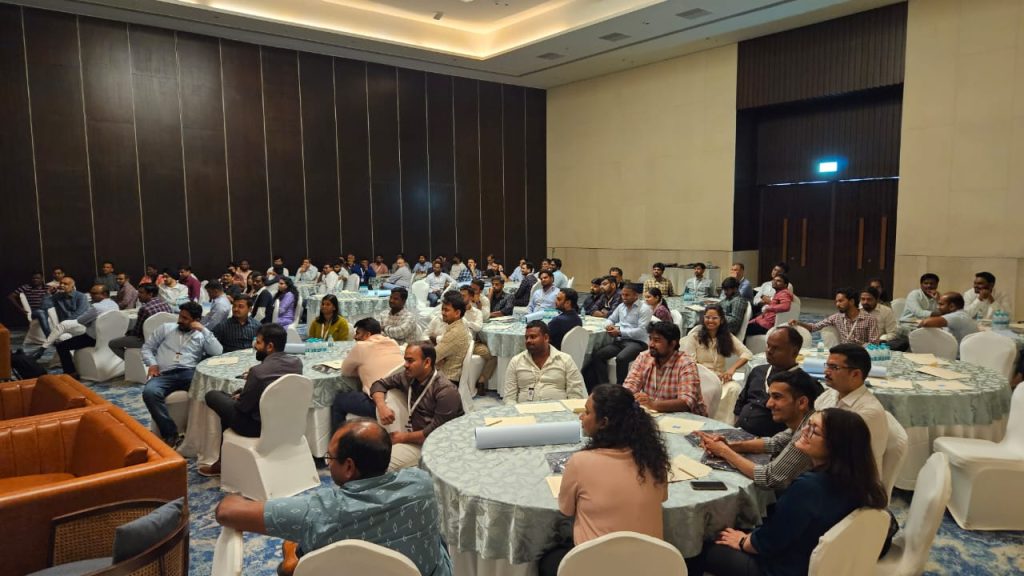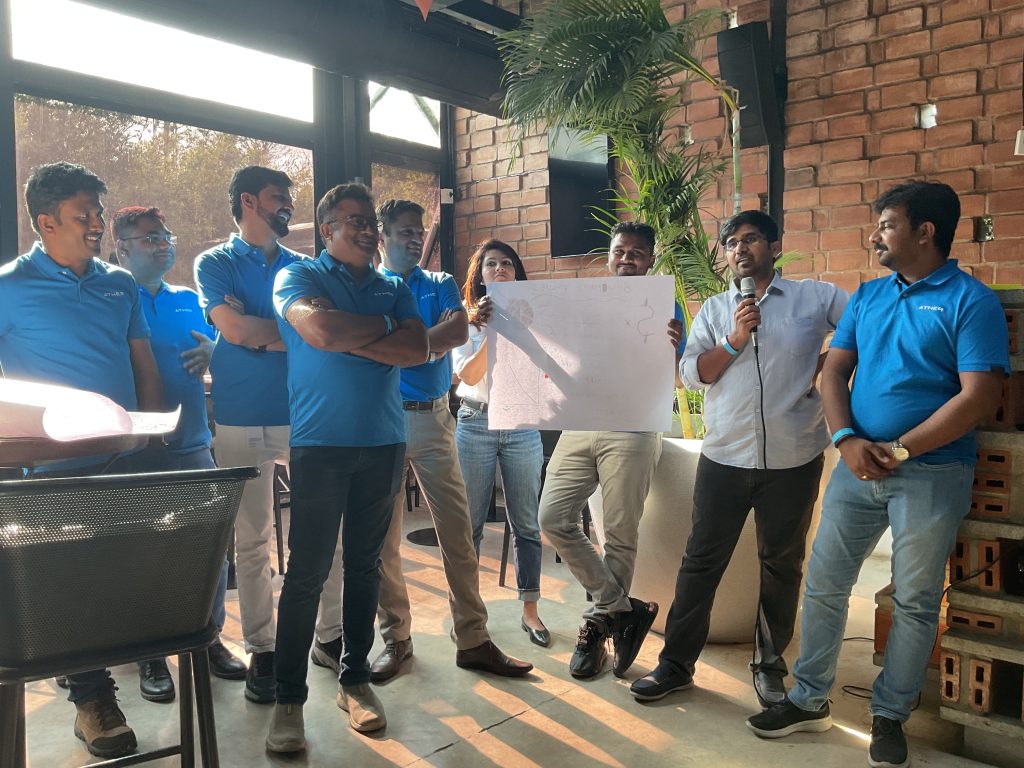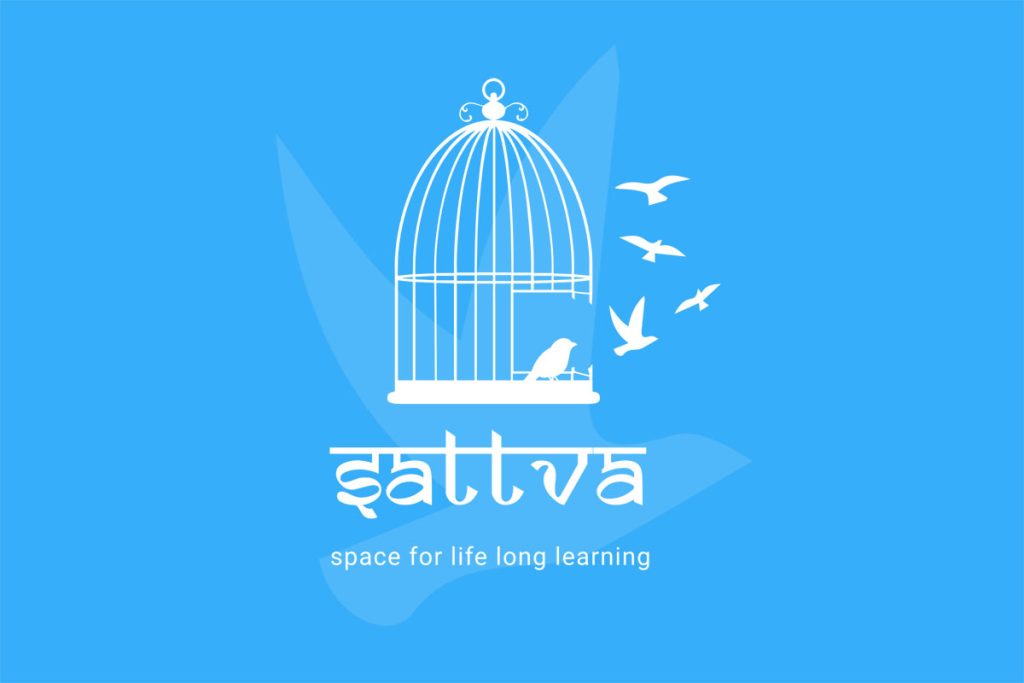
At Sattva, learning is not restricted based on age. In fact, we want to expand and provide relevant learning experiences for all the age groups. It is usually assumed that adults cannot learn, cannot grasp new things and it is tough to change their mindsets. But then these are the people who have learned to work with the technology that did not even exist a few years back. If adults can learn technology, they can also learn other skills and attitudes that are needed in the present context.
With this thought, we stepped into employee engagement events wherein we provide learning experiences which help employees of an organisation learn skills like team building, creative thinking and reflective thinking.
We have facilitated sessions for employees at events held by SID International and Guardant Health. Their event revolved around the theme “Blaze a trail” and we did an engaging session with around hundred employees. Following the theme we started to engage the employees with some questions and activities around how important it is to step outside the box and unlearn in the present context. This was followed by a group activity which helped employees connect with each other better and learn more about people they work with everyday. We also encouraged the participants to understand the dangers of a single story through a video and allowed them to think about how they can be more open to multiple perspectives. We shared a poem about safe space for employees to think critically about the culture that they want to work in. We did activities wherein we allowed employees to express themselves, be respectful in presenting different views and also design a corporate culture that is safer, more inclusive and happier. It was wonderful to observe that when given the opportunity the employees can contribute so much. The entire event encouraged employees to be innovative, to break free of patterns, to learn and unlearn, to be open to multiple perspectives and to work together for a better culture. We incorporated art, dance and games that helped employees learn in an engaging way.
We have also facilitated events for employees at Ather Energy in Bangalore. Their employee engagement theme was “together wheee can”. We had around hundred employees present at the session. We helped them understand the value of cooperation and collaboration in a context where we observe so much competition in every sphere of life. We had games where they had to achieve the goals together, and they had to make sure that no one from theri team was left behind. The event was filled with laughter, group work, conversations and learning. They got to know fellow employees better and they also explored opportunities to create a happier and more collaborative work culture.
Through such events, we promote global citizenship attributes like critical thinking, creative thinking, collaborating, being open to multiple perspectives and being empathetic to others. We try to encourage adults to learn something new by giving books and materials that help them tap into the new generation’s ideas. We make sure that we give the time and space for adults to absorb the upcoming things and adapt the new mindsets.
Sustainability
In all our events, we make sure that we use recycled papers, eco-friendly pens and pencils which can be used for a longer time. We make sure we use the same charts and colours for multiple events so that we create less waste and we are aware of the resources. We try to avoid plastic usage as much as possible, we also make sure that the prizes we give are eco-friendly and usable things. We do not promote a gifting culture that is not sustainable. For all events, we recommend people to bring their water bottles which can be refilled so that we don’t have to use paper cups or plastic cups. Whenever we provide food, we see to it that there is minimal wastage of food and resources. We make all possible attempts to promote sustainable practices through our events.


Why do we promote global citizenship education (GCED)?
Why do we need to focus on Global Citizenship Education in the present context?
Based on research and experience, I would like to list out the following reasons for integrating GCED in our curricula and educational practice.
1. Our philosophers and readers have emphasized the idea. In his philosophy on union of education and life, Tagore calls for every learner to become a “Visvakarma”, one who creates the world and acts for the benefit of all (Tagore, 1930; Haigh, 2016).
2. The National Education Policy 2020 clearly spells out that global citizenship education should become an integral part of the education system (Ministry of Human Resource Development, 2020). Further, it can help solve various issues of the present education system including rote learning, cut-throat competition, brain drain, stressful and unsafe educational environment and others.
3. The challenges humankind faces today are interconnected yet distinct and thus, response also has to be unique. Understanding the connection between issues at local, national and global level and then acting in immediate surroundings is at the heart of global citizenship.
4. Integrating GCED implies improvement in pedagogy, student engagement, stress reduction and thus, an improvement in the overall quality of education at large. We want to challenge the old and strict ways of learning, and bring in new pedagogies that can help promote fun-learning, and allow students to think critically. We want to promote student-centred learning and hence change the approach of teaching. 5. GCED can foster all necessary skills including creativity, innovative thinking, problem solving and most importantly develop the optimistic attitude among the students that their everyday actions can help create a more just and sustainable world
At Sattva, we strongly believe that education should be limited to materialistic aims, but it should also involve developing citizens who can act for a better world and hence we promote GCED through our events, sessions and materials. We want to develop a community of people who feel a sense of belonging to this world and are willing to take actions for a sustainable future.
Martha Nussbaum says “the real clash of civilisation is a clash within the individual, as greed and narcissism contend against respect and love, all modern societies are losing the battle. If we do not insist on the crucial importance of the humanities and arts, they will drop away because they do not make money”. Distracted by the pursuit of wealth, we are turning our students into profit makers and mere workers rather than thoughtful citizens. This is what we want to change. At Sattva, we want to educate for transformation, and not just for marks, certificates, degrees and jobs.




